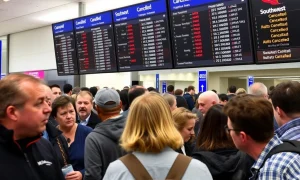Recent news of a major airline permanently canceling flights to three cities has sent ripples through the travel sector. Passengers are naturally concerned about their tickets and the process of obtaining refunds. This development, however, extends beyond individual inconvenience. It highlights critical aspects of financial stability within the airline industry and the urgent need for robust Airline Refund Solutions. Understanding these financial dynamics is crucial for both consumers and industry stakeholders. Ultimately, this event underscores how traditional financial systems face challenges in handling mass disruptions efficiently.
The Financial Ripple Effect of Flight Cancellations
When an airline cancels flights, the immediate impact on passengers is clear. They face disrupted travel plans and the burden of securing alternative arrangements. However, the financial consequences for the airline and the broader economy are also significant. Consequently, airlines incur substantial costs related to rebooking, compensation, and processing refunds. This situation places a considerable strain on operational budgets.
Moreover, these cancellations can erode consumer trust. A reliable refund process is vital for maintaining customer confidence in an airline. Delays or complications in issuing refunds can lead to reputational damage. Therefore, efficient Airline Refund Solutions are not merely a customer service issue; they are a fundamental component of an airline’s financial health and market standing. The scale of these cancellations also impacts related industries, including hotels and ground transportation.
Understanding Current Airline Refund Processes
Currently, airline refund processes often involve multiple steps and intermediaries. Passengers typically submit refund requests through the airline’s website or customer service. The airline then verifies the request against its booking and cancellation policies. Subsequently, the refund is processed through traditional banking channels. This often means money moves from the airline’s account, through payment processors, and finally to the passenger’s bank account.
This multi-stage process, however, can introduce delays. Common pain points include:
- Manual Verification: Many steps require human intervention, slowing down the process.
- Banking Delays: Interbank transfers can take several business days to complete.
- Lack of Transparency: Passengers often lack real-time updates on their refund status.
- Dispute Resolution: Resolving discrepancies or disputes can be time-consuming and frustrating.
Clearly, these inefficiencies highlight areas where modern financial technologies could offer significant improvements. Enhancing these processes is key to better customer experience.
Exploring Innovative Airline Refund Solutions
The challenges associated with traditional refund mechanisms are prompting a search for more innovative approaches. Modern financial technology (FinTech) offers promising avenues for streamlining these processes. For instance, digital payment systems and distributed ledger technologies (DLT) present opportunities for greater efficiency. These technologies could significantly reduce the time and cost associated with processing refunds.
Ultimately, the goal is to create a seamless, transparent, and rapid refund experience. This would benefit both passengers and airlines. Passengers would receive their money faster, while airlines would reduce administrative overheads. Implementing advanced Airline Refund Solutions could transform how the industry handles financial transactions related to disruptions. Furthermore, it could build stronger relationships with customers.
Blockchain’s Role in Enhancing Refund Transparency
Blockchain technology, underpinning cryptocurrencies, offers a compelling framework for improving refund processes. Its decentralized and immutable ledger system can record transactions transparently. This feature is particularly beneficial for financial operations requiring high levels of trust and accountability. Moreover, smart contracts, self-executing contracts with the terms of the agreement directly written into code, can automate refund procedures.
Consider these potential benefits:
- Automated Refunds: Smart contracts could trigger refunds automatically upon flight cancellation, eliminating manual processing.
- Immutable Records: Every refund transaction would be permanently recorded on the blockchain, preventing disputes over whether a refund was initiated or received.
- Enhanced Transparency: Passengers could track their refund status in real-time on a public or permissioned ledger.
- Reduced Fraud: The secure nature of blockchain can minimize fraudulent refund claims.
Implementing such a system would significantly enhance the efficiency and trustworthiness of Airline Refund Solutions. It provides a clear audit trail for all parties involved.
Beyond Refunds: Financial Stability in the Travel Sector
While efficient refunds are crucial, the broader implications for financial stability in the travel sector are also important. Frequent or large-scale cancellations, combined with inefficient refund processes, can severely impact an airline’s cash flow. This situation can lead to liquidity issues, especially for carriers already operating on thin margins. Therefore, robust financial infrastructure is paramount for industry resilience.
Moreover, consumer confidence directly affects future bookings. A reputation for slow or difficult refunds can deter passengers from choosing a particular airline. Consequently, airlines must invest in systems that foster trust. Effective Airline Refund Solutions are not just about managing a crisis; they are about building a sustainable business model that prioritizes customer satisfaction and financial prudence. This proactive approach ensures long-term viability.
Challenges and Future Outlook for Airline Refund Solutions
Despite the clear advantages, implementing new Airline Refund Solutions, especially those leveraging blockchain, faces several challenges. Firstly, industry-wide adoption requires significant collaboration among airlines, payment processors, and regulators. Secondly, integrating new technologies with legacy IT systems can be complex and costly. Furthermore, regulatory frameworks around digital assets and automated contracts are still evolving.
However, the future outlook remains promising. As digital literacy increases and blockchain technology matures, its application in mainstream finance becomes more feasible. Airlines that proactively embrace these innovations will likely gain a competitive edge. They will offer superior customer experiences and achieve greater operational efficiency. Ultimately, the move towards more sophisticated refund systems is inevitable as the travel industry continues to modernize.
In conclusion, the recent flight cancellations underscore the vital role of efficient financial mechanisms in the travel industry. The need for swift, transparent, and reliable Airline Refund Solutions is more pressing than ever. By embracing innovative technologies like blockchain, airlines can transform their refund processes. This will enhance consumer trust and bolster their financial resilience. Ultimately, these advancements will benefit passengers, airlines, and the broader financial ecosystem, fostering a more secure and efficient travel experience for everyone involved.
Frequently Asked Questions (FAQs)
What happens if an airline permanently cancels my flight?
If an airline permanently cancels your flight, you are generally entitled to a full refund for the unused portion of your ticket. Airlines typically offer alternative flights or travel vouchers as well. However, you usually have the right to choose a refund.
How long do airline refunds typically take to process?
The time frame for airline refunds varies significantly. Traditional processes can take anywhere from 7 to 30 business days, depending on the airline’s policies and your bank’s processing times. Factors like the volume of refund requests can also cause delays.
Can blockchain technology speed up airline refunds?
Yes, blockchain technology has the potential to significantly speed up airline refunds. By using smart contracts, refunds could be automatically triggered and processed almost instantly upon cancellation. This eliminates manual steps and traditional banking delays, offering more efficient Airline Refund Solutions.
Are airline refund solutions standardized across the industry?
No, airline refund solutions are not fully standardized across the industry. While most airlines adhere to general consumer protection laws, the specific processes, timelines, and customer service approaches can differ. This lack of standardization often contributes to passenger frustration during cancellations.
What are the benefits of transparent refund processes for passengers?
Transparent refund processes offer several benefits for passengers. These include real-time tracking of refund status, clear communication about timelines, and reduced ambiguity. This transparency builds trust and reduces anxiety, leading to a better overall customer experience. It also minimizes the potential for disputes.
How do flight cancellations impact an airline’s financial health?
Flight cancellations can significantly impact an airline’s financial health by increasing operational costs, reducing revenue, and potentially leading to liquidity challenges. Managing refunds efficiently and maintaining consumer trust through effective Airline Refund Solutions are crucial for mitigating these financial risks and ensuring long-term stability.
























